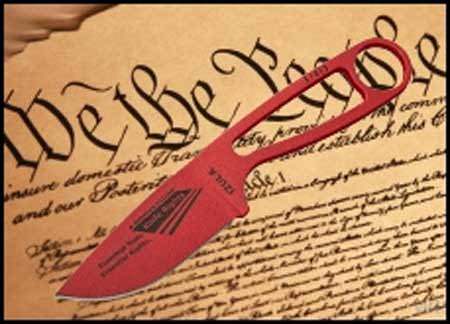Guarantees Of The Right To Arms In State Constitutions


Manasquan, NJ –-(Ammoland.com)- It seems that people who live in states who’s founding fathers failed to record that individuals have the Right to Keep And Bear Arms within each state constitution, do have something to lose.
The states were talking about, California, Iowa, Maryland, Minnesota, New Jersey, and New York, do not have “right to keep and bear arms” provisions in their state constitutions. Of those listed here, only two, Iowa and Minnesota, have managed to hold on to some or all of their rights.
The rest, CA, NY, MD and the worst, New Jersey, have had resident’s rights stripped a way by mostly Democrat run legislatures. Just one look at the run down of article headlines by state (see list below) and you can quickly see that having a state constitution the clearly spells out your right to keep and bear arms seems to be a corner stone of keeping those rights intact.
AmmoLand Shooting Sports News state article archive, click the links to have a look:
Curious what your state wording reads? Keep reading for the low down. Hat-Tip: NRA-ILA.
Alabama
That the great, general and essential principles of liberty and free government may be recognized and established, we declare…. That every citizen has a right to bear arms in defense of himself and the state. (Ala. Const. art. I, § 26) (1819).
Alaska
A well-regulated militia being necessary to the security of a free state, the right of the people to keep and bear arms shall not be infringed. The individual right to keep and bear arms shall not be denied or infringed by the State or a political subdivision of the State. (Alaska Const. art. I, § 19) (1994; previous version 1959).
Arizona
The right of the individual citizen to bear arms in defense of himself or the State shall not be impaired, but nothing in this section shall be construed as authorizing individuals or corporations to organize, maintain or employ an armed body of men. (Ariz. Const. art. II, § 26) (1912).
Arkansas
The citizens of this State shall have the right to keep and bear arms for their common defense. (Ark. Const. art. II, § 5) (1868; previous versions 1864, 1861, 1836).

California
No “right to keep and bear arms” provision.
Colorado
The right of no person to keep and bear arms in defense of his home, person and property, or in aid of the civil power when thereto legally summoned, shall be called in question; but nothing herein contained shall be construed to justify the practice of carrying concealed weapons. (Colo. Const. art. II, § 13) (1876).
Connecticut
Every citizen has a right to bear arms in defense of himself and the state. (Conn. Const. art. I, § 15) (1818).
Delaware
A person has the right to keep and bear arms for the defense of self, family, home and State, and for hunting and recreational use. (Del. Const. art. I, § 20) (1987).
Florida
The right of the people to keep and bear arms in defense of themselves and of the lawful authority of the state shall not be infringed, except that the manner of bearing arms may be regulated by law. (Fla. Const. art. I, § 8, [a]) (1990; previous versions 1968, 1885, 1868, 1838). (Note that subsection (b) imposes a mandatory period of three days, excluding weekends and legal holidays, between the purchase and delivery at retail of any handgun. Holders of a concealed weapon permit as prescribed in Florida law are exempted.)
Georgia
The right of the people to keep and bear arms shall not be infringed, but the General Assembly shall have the power to prescribe the manner in which arms may be borne. (Ga. Const. art. I, § 1, para. VIII) (1982; previous versions 1877, 1868, 1865).
Hawaii
A well regulated militia being necessary to the security of a free state, the right of the people to keep and bear arms shall not be infringed. (Haw. Const. art. I, § 17) (1978).
Idaho
The people have the right to keep and bear arms, which right shall not be abridged; but this provision shall not prevent the passage of laws to govern the carrying of weapons concealed on the person nor prevent passage of legislation providing minimum sentences for crimes committed while in possession of a firearm, nor prevent passage of legislation providing penalties for the possession of firearms by a convicted felon, nor prevent the passage of legislation punishing the use of a firearm. No law shall impose licensure, registration or special taxation on the ownership or possession of firearms or ammunition. Nor shall any law permit the confiscation of firearms, except those actually used in the commission of a felony. (Idaho Const. art. I, § 11) (1978; previous version 1889).
Illinois
Subject only to the police power, the right of the individual citizen to keep and bear arms shall not be infringed. (Ill. Const. art. I, § 22) (1970).
Indiana
The people shall have a right to bear arms, for the defense of themselves and the State. (Ind. Const. art. I, § 32) (1851; previous version, 1816).

Iowa
No “right to keep and bear arms” provision.
Kansas
A person has the right to keep and bear arms for the defense of self, family, home and state, for lawful hunting and recreational use, and for any other lawful purpose; but standing armies, in time of peace, are dangerous to liberty, and shall not be tolerated, and the military shall be in strict subordination to the civil power. (Kan. Const. Bill of Rights, § 4) (2010; previous version 1861).
Kentucky
All men are, by nature, free and equal, and have certain inherent and inalienable rights, among which may be reckoned: … [t]he right to bear arms in defense of themselves and of the State, subject to the power of the General Assembly to enact laws to prevent persons from carrying concealed weapons. (Ky. Const. § 1) (1891; previous versions 1850, 1799).
Louisiana
The right of each citizen to keep and bear arms is fundamental and shall not be infringed. Any restriction on this right shall be subject to strict scrutiny. (La. Const. art. I, § 11) (enacted 2012; previous versions 1974, 1879).
Maine
Every citizen has a right to keep and bear arms and this right shall never be questioned. (Me. Const. art. I, § 16) (1987; previous version 1819).

Maryland
No “right to keep and bear arms” provision.
Massachusetts
The people have a right to keep and bear arms for the common defence. And as, in time of peace, armies are dangerous to liberty, they ought not to be maintained without the consent of the legislature; and the military power shall always be held in an exact subordination to the civil authority, and be governed by it. (Mass. Const. pt. I, art. XVII) (1780).
Michigan
Every person has a right to keep or bear arms for the defense of himself and the state. (Mich. Const. art. I, § 6) (1963; previous versions 1850, 1835).

Minnesota
No “right to keep and bear arms” provision.
Mississippi
The right of every citizen to keep and bear arms in defense of his home, person, or property, or in aid of the civil power when thereto legally summoned, shall not be called in question, but the legislature may regulate or forbid carrying concealed weapons. (Miss. Const. art. III, § 12) (1890; previous versions 1868, 1817).
Missouri
That the right of every citizen to keep and bear arms in defense of his home, person, and property, or when lawfully summoned in aid of the civil power, shall not be questioned; but this shall not justify the wearing of concealed weapons. (Mo. Const. art. I, § 23) (1945; previous versions 1875, 1865, 1820).
Montana
The right of any person to keep or bear arms in defense of his own home, person, and property, or in aid of the civil power when thereto legally summoned, shall not be called in question; but nothing herein contained shall be held to permit the carrying of concealed weapons. (Mont. Const. art. II, § 12).
Militia forces shall consist of all able-bodied citizens of the state except those excepted by law. (Mont. Const. art. VI, § 13) (1889).
Nebraska
All persons are by nature free and independent, and have certain inherent and inalienable rights; among these are life, liberty, the pursuit of happiness, and the right to keep and bear arms for security or defense of self, family, home and others, and for lawful common defense, hunting, recreational use and all other lawful purposes, and such rights shall not be denied or infringed by the state or any subdivision thereof. (Neb. Const. art. I, § 1) (1988) (previous version 1875).
Nevada
Every citizen has the right to keep and bear arms for security and defense, for lawful hunting and recreational use and for other lawful purposes. (Nev. Const. art. I, § 11 (1)) (1982).
New Hampshire
All persons have the right to keep and bear arms in defense of themselves, their families, their property and the state. (N.H. Const. pt. I, art. 2-a) (1982).
No person, who is conscientiously scrupulous about the lawfulness of bearing arms, shall be compelled thereto. (N.H. Const. pt. I, art. 13) (1982).
New Jersey
No “right to keep and bear arms” provision.
New Mexico
No law shall abridge the right of the citizen to keep and bear arms for security and defense, for lawful hunting and recreational use and for other lawful purposes, but nothing herein shall be held to permit the carrying of concealed weapons.
No municipality or county shall regulate, in any way, an incident of the right to keep and bear arms. (N.M. Const. art. II, § 6) (1986; previous versions 1971, 1912).

New York
No “right to keep and bear arms” provision
North Carolina
A well regulated militia being necessary to the security of a free State, the right of the people to keep and bear arms shall not be infringed; and, as standing armies in time of peace are dangerous to liberty, they shall not be maintained, and the military shall be kept under strict subordination to, and governed by, the civil power. Nothing herein shall justify the practice of carrying concealed weapons, or prevent the General Assembly from enacting penal statutes against that practice. (N.C. Const. art. I, § 30) (1971; previous versions 1876, 1868, 1776).
North Dakota
All individuals are by nature equally free and independent and have certain inalienable rights, among which are those of enjoying and defending life and liberty; acquiring, possessing and protecting property and reputation; pursuing and obtaining safety and happiness; and to keep and bear arms for the defense of their person, family, property, and the state, and for lawful hunting, recreational and other lawful purposes, which shall not be infringed. (N.D. Const. art. I, § 1) (1984).
Ohio
The people have the right to bear arms for their defense and security; but standing armies, in time of peace, are dangerous to liberty, and shall not be kept up; and the military shall be in strict subordination to the civil power. (Ohio Const. art. I, § 4) (1851; previous version 1802).
Oklahoma
The right of a citizen to keep and bear arms in defense of his home, person or property, or in aid of the civil power, when thereunto legally summoned, shall never be prohibited; but nothing herein contained shall prevent the Legislature from regulating the carrying of weapons. (Okla. Const. art. II, § 26) (1907).
Oregon
The people shall have the right to bear arms for the defence of themselves, and the State, but the Military shall be kept in strict subordination to the civil power[.] (Or. Const. art. I, § 27) (1857).
Pennsylvania
The right of the citizens to bear arms in defence of themselves and the State shall not be questioned. (Pa. Const. art. I, § 21) (1790).
Rhode Island
The right of the people to keep and bear arms shall not be infringed. (R.I. Const. art. I, § 22) (1842).
South Carolina
A well regulated militia being necessary to the security of a free State, the right of the people to keep and bear arms shall not be infringed. As, in times of peace, armies are dangerous to liberty, they shall not be maintained without the consent of the General Assembly. The military power of the State shall always be held in subordination to the civil authority and be governed by it. No soldier shall in time of peace be quartered in any house without the consent of the owner nor in time of war but in the manner prescribed by law. (S.C. Const. art. I, § 20) (1895; previous version 1868).
South Dakota
The right of the citizens to bear arms in defense of themselves and the state shall not be denied. (S.D. Const. art. VI, § 24) (1889).
Tennessee
That the citizens of this State have a right to keep and bear arms for their common defense; but the Legislature shall have power, by law, to regulate the wearing of arms with a view to prevent crime. (Tenn. Const. art. I, § 26) (1870; previous versions 1834, 1796).
Texas
Every citizen shall have the right to keep and bear arms in lawful defense of himself or the State; but the Legislature shall have power, by law, to regulate the wearing of arms, with a view to prevent crime. (Tex. Const. art. I, § 23) (1876; previous versions 1868, 1845)
Note: The Texas Declaration of Independence stated that “[The Mexican government] has demanded us to deliver up our arms, which are essential to our defense—the rightful property of freemen—and formidable only to tyrannical governments.” The Republic of Texas Constitution of 1836 also protected Texans` right to arms: Every citizen shall have the right to bear arms in defence of himself and the republic. The military shall at all times and in all cases be subordinate to the civil power.”
Utah
The individual right of the people to keep and bear arms for security and defense of self, family, others, property, or the state as well as for other lawful purposes shall not be infringed; but nothing herein shall prevent the Legislature from defining the lawful use of arms. (Utah Const. art. I, § 6) (1984; previous version 1895).
Vermont
That the people have a right to bear arms for the defence of themselves and the State—and as standing armies in time of peace are dangerous to liberty, they ought not to be kept up; and that the military should be kept under strict subordination to and governed by the civil power. (Vt. Const. ch. I, art. 16) (1777).
Virginia
That a well regulated militia, composed of the body of the people, trained to arms, is the proper, natural and safe defense of a free state, therefore, the right of the people to keep and bear arms shall not be infringed; that standing armies, in time of peace, should be avoided as dangerous to liberty; and that in all cases the military should be under strict subordination to, and governed by, the civil power. (Va. Const. art. I, § 13) (1971; previous version 1776).
Washington
The right of the individual citizen to bear arms in defense of himself, or the state, shall not be impaired, but nothing in this section shall be construed as authorizing individuals or corporations to organize, maintain or employ an armed body of men. (Wash. Const. art. I, § 24) (1889).
West Virginia
A person has the right to keep and bear arms for the defense of self, family, home, and state, and for lawful hunting and recreational use. (W.Va. Const. art. III, § 22) (1986).
Wisconsin
The people have the right to keep and bear arms for security, defense, hunting, recreation, or any other lawful purpose. (Wisc. Const. art. 1, § 25) (1998).
Note also: The people have the right to fish, hunt, trap, and take game subject only to reasonable restrictions as prescribed by law. (Wisc. Const. art. 1, § 26) (2003).
Wyoming
The right of the citizens to bear arms in defense of themselves and of the state shall not be denied. (Wyo. Const. art. I, § 24) (1889).
Other States
As noted, California, Iowa, Maryland, Minnesota, New Jersey, and New York do not have “right to keep and bear arms” provisions in their state constitutions.
Two of these states have general provisions that protect a right to defend life and liberty:
Iowa – Iowa`s constitution states: “All men and women are, by nature, free and equal, and have certain inalienable rights—among which are those of enjoying and defending life and liberty, acquiring, possessing and protecting property, and pursuing and obtaining safety and happiness.” (Iowa Const. art. I, § 1) (1998).
New Jersey – New Jersey`s constitution reads: “All persons are by nature free and independent, and have certain natural and unalienable rights, among which are those of enjoying and defending life and liberty, of acquiring, possessing, and protecting property, and of pursuing and obtaining safety, and happiness.” (N.J. Const. art. I, § 1) (1947).
About:
Established in 1975, the Institute for Legislative Action (ILA) is the “lobbying” arm of the National Rifle Association of America. ILA is responsible for preserving the right of all law-abiding individuals in the legislative, political, and legal arenas, to purchase, possess and use firearms for legitimate purposes as guaranteed by the Second Amendment to the U.S. Constitution. Visit: www.nra.org




The Maryland Constitution states that the Constitution of the United States shall be the supreme law of the STATE. That specifically incorporates the 2A in the Maryland Constitution…
All laws which are repugnant to the Constitution are null and void, Chief Justice Marshall, Marbury vs. Madison, 5, U.S. (1 Cranch) 137, 174, 176, (1803). The claim and exercise of a constitution right cannot be converted into a crime. Miller v. U.S. 230 F 486 at 489. There can be no sanction or penalty imposed upon one because of his exercise of Constitution rights. Sherar vs. Cullen 481 F 2D 946, (1973). . People are supreme, not the state. Waring vs. the Mayor of Savanah, 60 Georgia at 93. The United States Supreme Court stated further that all rights… Read more »
In August of this year, Missouri modified their constitution which removed the concealed carry clause and demands that in all legislation that the right to keep and bear arms in Missouri should be upheld and foremost in any bill.
I’ll bet Missouri adopts constitutional carry next….
You can already hear the control freaks heads exploding across the state .
Minnesota has very little gun “control” respective to other no clause states. It’s the result of organization and political savvy on the part of the Gun Owners Civil Rights Alliance. The NRA works with the locals for the benefit of all.
Maryland’s current state Declaration of Rights has a complete Mason Triad with leading “well regulated Milita” language that originated during the Revolutionary Era as one of four such Second Amendment predecessors. This provision was understood as a limit on state government power protecting an armed population capable of keeping government raised forces under the control of the civil population or “civil power”. In short, it was intended to protect the right of the people to keep and bear arms. My 2011 Journal on Firearms and Public Policy article, The American Revolutionary Era Origin of the Second Amendment’s Clauses, which is… Read more »
The United States of America Constitution (that all of the individual States voted to approve and join together in forming this Country) has the Bill of Rights etc. that guarantee the MINIMUM stated freedoms for all the Citizens of the joining States when they join the U.S.A. Those are specified MINIMUM freedom standards for the populace and individual States should not need to replicate what they have already agreed to when joining the United States and its Constitutional GUARANTEED Freedoms. If a State approves more freedom …that additional freedom is not going against the Constitution of the U.S.A.( that was… Read more »
Illinois citizens have had their right to bear arms stripped away by NRA lobbyist Todd Vandermyde in Rep. Brandon Phelps HB183 carry bill: Duty to Inform w/ criminal penalties of 6 MONTHS or 1 YEAR in jail, because the Chiefs of Police wanted it, an UNLIMITED state and federal privacy waiver, because the loser hicks in southern IL “have nothing to hide,” and an unelected Star Chamber conceal carry review Board, so the cops can blackball anyone they don’t like with legal cover.
Do Chris Cox & Chuck Cunningham actually pay money to this traitor?